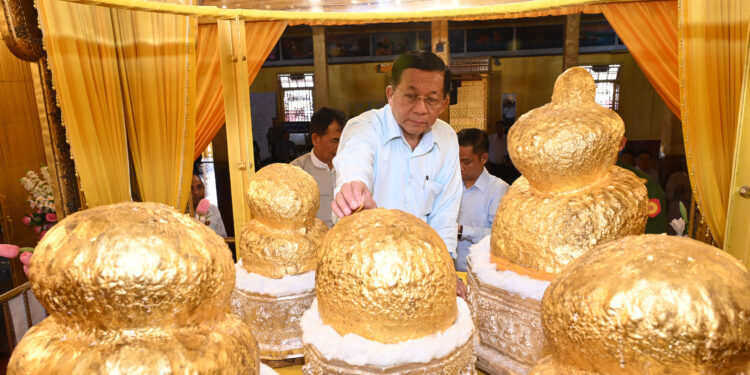Junta boss Min Aung Hlaing in a Thingyan message on Thursday repeated his call for everyone to cooperate with elections he plans to hold at the end of the year.
Min Aung Hlaing promised “free and fair elections” in December and said he has offered “to solve ongoing conflicts through political means.”
The regime has come under fire as it is busy preparing for the polls while it should be focusing on relief efforts in the aftermath of a devastating earthquake that claimed more than 3,700 lives and wrecked tens of thousands of homes.
The junta’s slow response and inactivity have been widely criticized as a major factor contributing to high fatalities.
So far, over 50 political parties have registered for the elections, but only the military’s proxy Union Solidarity and Development Party (USDP) has announced it is ready.
Under the military-drafted 2008 Constitution, a quorum in parliament only requires one-third of lawmakers in attendance, and since the Constitution reserves 25 percent of seats for the military, the regime only needs another eight percent elected lawmakers to convene parliament.
Min Aung Hlaing said the elections will be held in phases from the third week of December to the second week of January. If they take place as planned, he will then be able to claim much-needed legitimacy for his putschist government.
China, Russia, India, Belarus, Thailand, and Cambodia have expressed support for the elections.
But western democracies including the U.S. as well as the civilian National Unity Government and other regime opponents have condemned them as a sham designed to maintain the military’s grip on power.
Despite Min Aung Hlaing’s call to resolve conflicts through political means, his regime continued to conduct air raids throughout the Thingyan holidays, bombing several monasteries in resistance-held areas while Buddhists were making merit there.
At least 26 airstrikes on civilian targets over the four-day festival in seven regions and states killed at least 23 people, including children and novices, and injured some 50 others, according to data compiled by The Irrawaddy.
Malaysia, the ASEAN chair for 2025, has called on the regime to halt violence first instead of focusing on the elections.
Malaysian Prime Minister Anwar Ibrahim met with junta boss Min Aung Hlaing behind closed doors in Bangkok on Thursday, reportedly to discuss a ceasefire and earthquake relief efforts.
Over the past four years, Min Aung Hlaing has turned a deaf ear to ASEAN’s Five-Point Consensus, a peace plan to end the civil war, and has in turn been barred from high-level ASEAN meetings. But Myanmar’s deadliest disaster in years has forced the two sides to re-engage.

















